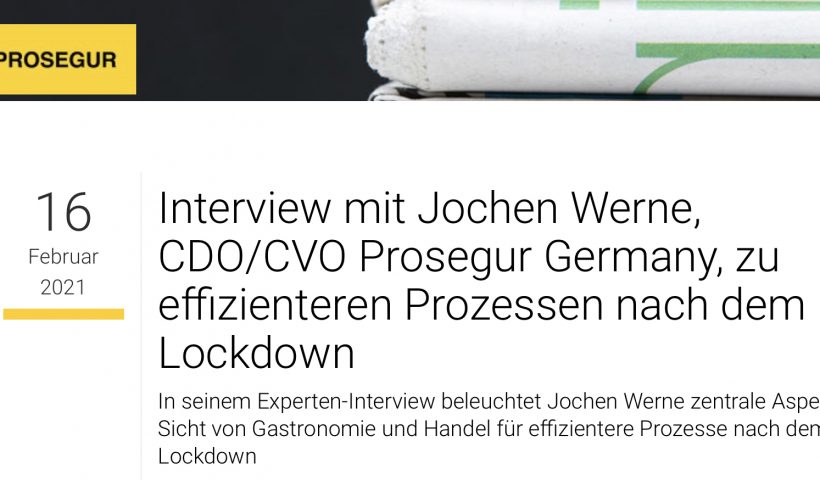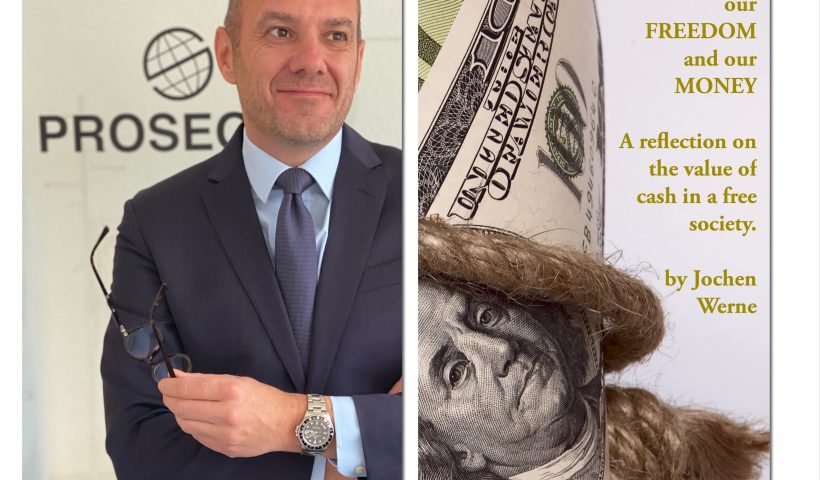Interview mit Jochen Werne, CDO/CVO Prosegur Germany, zu effizienteren Prozessen nach dem Lockdown
In seinem Experten-Interview beleuchtet Jochen Werne zentrale Aspekte aus Sicht von Gastronomie und Handel für effizientere Prozesse nach dem Lockdown
Publiziert von Prosegur Deutschland: LINK HIER
Herr Werne, was sind Ihre persönlichen Beobachtungen in Bezug auf Wirtschaft und Gesellschaft nach einem Jahr der Krise?
Jede Krise bringt natürlich zunächst einmal Leid mit sich und eine Pandemie selbstverständlich Leid für den Einzelnen und seine Angehörigen, wenn ihn das Schicksal, der durch das Virus ausgelösten Krankheit ereilt. Alles Weitere ist wie eine Kettenreaktion. Beginnend vom Staat, der die hoheitliche Aufgabe hat seine Bürger zu schützen und dies im Falle einer Pandemie auch mit dem Herunterfahren des gesellschaftlichen Lebens durchsetzt. Dies wiederum hat bei geschlossenen Unternehmen die Folge drastischer Einkommenseinbußen bei weiterlaufenden Kosten. Bei nicht ausreichender Liquidität führt dies dann zu Insolvenzen, Arbeitsplatzverlusten und im schlimmsten Fall zu einer Wirtschaftskrise. Geschichtlich gesehen hat jedoch auch jede Krise – und diese ist keine Ausnahme – dazu geführt, dass die Wirtschaft effizienter wird und technologische Trends eine Beschleunigung erfahren.
Im Moment – in dieser für viele so schwierigen Situation – beobachte ich eine unglaubliche und inspirierende Kreativität. Sie beginnt bei den kleinen und mittelständischen Unternehmen, die sich versuchen agil, der gefühlt täglich neuen Lage anzupassen, sich zu verbessern, Kosten zu optimieren und sich optimal für die Zeit nach der Krise aufzustellen. Das stimmt hoffnungsfroh für die Zeit nach der Krise und es ist eine große Motivation mit einem fantastischen Team den eigenen Teil dazu beitragen zu können.
Jede Krise fordert von Unternehmen eine gewisse Resilienz. Die nationale Akademie der Technikwissenschaften (acatech), hat zum Digitalgipfel der Bundesregierung im November ein Impulspapier mit dem Titel „Resiliente Vorreiter“ vorgestellt. Darin wird Prosegur mit deiner digitalen Smart Cash Lösung als Best Practice Besipiel für ein zukunftsgerichtetes und kostenoptiertes Cash Managment für den Handel und die Gastronomie genannt. Wie funktioniert Prosegur Smart Cash?
Mit Prosegur Smart Cash können Gastronomen, Einzel- oder Großhändler Bargelder zur sicheren Verwahrung direkt in das Smart Cash Gerät einführen. Das Besondere – im Gegensatz zu einem einfachen Tresor ist es, dass einmal eingeführt, das Gerät automatisch das tägliche Zählen und Abrechnen des Bargeldes übernimmt. Die Zeit- und somit Kostenersparnis in den internen Prozessen bei unseren Kunden ist teilweise beträchtlich. Das Gerät verfügt über ein Kommunikationsprotokoll, das die Überweisung des Wertes der Abholung auf das Bankkonto des Kunden innerhalb von 24 Stunden ermöglicht. Sobald sich das Geld im Gerät befindet, liegt die Verantwortung und Verwaltung bei dem spezialisierten Team von Prosegur Cash, das für den Transport und die Verwahrung des Geldes zur Bankfiliale verantwortlich ist. Somit entfällt auch der teilweise tägliche und nicht ungefährliche Gang zur Bankfiliale.
Was sind die Vorteile von Prosegur Smart Cash?
Zusammengefasst spart es unseren Kunden Zeit und Geld und schafft mehr Transparenz und Sicherheit. Die Kunden von Prosegur Smart Cash können ihr Bargeld schnell und sicher aufbewahren und so unbekannte Verluste reduzieren. Prosegur Smart Cash ermöglicht eine Zeitersparnis durch die Automatisierung des Zählens und bei der täglichen Abrechnung des Bargeldes. Darüber hinaus muss der Kunde dank Prosegur Smart Cash nicht zur Bank gehen, um das Bargeld einzuzahlen, da Prosegur für die Sicherheit bei der Verwaltung und Übergabe des gesamten Bargelds an die Bank sorgt, was gefährliche Situationen für den Kunden vermeidet und ihm hilft, Zeit zu sparen, damit er sich voll und ganz seinem Geschäft widmen kann. Außerdem reduziert eine Smart Cash Lösung das häufige und teure Phänomen des sogenannten „unbekannten Verlustes“.
Was ist „Unbekannter Verlust“?
Jochen Werne: Hierbei handelt sich um den Verlust von Inventar oder anderen Geschäftsressourcen, der auf eine Vielzahl von Faktoren zurückzuführen ist, wie z. B. interner und externer Diebstahl, Verwaltungsversagen, Betrug oder Fehler im Cashflow. Diese Situation stellt für Gastronomen und Einzelhändler oftmals ein zentrales Problem dar.
Was beobachten Sie, in Bezug auf ihre Kunden und wie sich diese auf die Zeit nach dem Lockdown vorbereiten?
Jochen Werne: Es ist eine unglaubliche Sehnsucht zu beobachten, endlich wieder mit seinen Kunden in Kontakt treten zu dürfen, um Ihnen wieder leidenschaftlich die eigenen Leistungen und Services bieten zu dürfen. Viele Kleine und mittelständische Unternehmen, von den großen ganz abgesehen, haben massiv in Hygienekonzepte investiert und versucht die Zeit zu nutzen um die eigenen Prozesse zu kostenoptimieren.
Wir selbst haben noch nie so viele Beratungsgespräche in Bezug auf smarte Bargeldlösungen geführt wie heute. Dies hat sich noch einmal erhöht, nachdem deutliche Aussagen und Studien der Weltgesundheitsorganisation (WHO) und der Bundesbank darauf hinwiesen, dass die hygienische Sauberkeit vom Bargeld mindestens gleich dem von Kartenzahlungen ist und eine Ansteckungsgefahr in Bezug auf unsere täglichen Bezahlmethoden in beiden Fällen geringst ist.
Interessanterweise haben wir auch eine hohe Nachfrage nach Effizienzhebung bei Unternehmen mit kleinem Bargeldaufkommen festgestellt und die Zeit genutzt um als erstes Unternehmen in Deutschland auch für diese Gruppe eine entsprechende sehr kostengünstige digitalte Lösungen zu entwickeln. Eine Krise zwingt immer alle effizienter zu werden und es gibt meiner Meinung nach nichts besseres, als dies gemeinsam zu tun. Nur so schafft man es gemeinsam aus einer Krise gestärkt hervor zu gehen.


